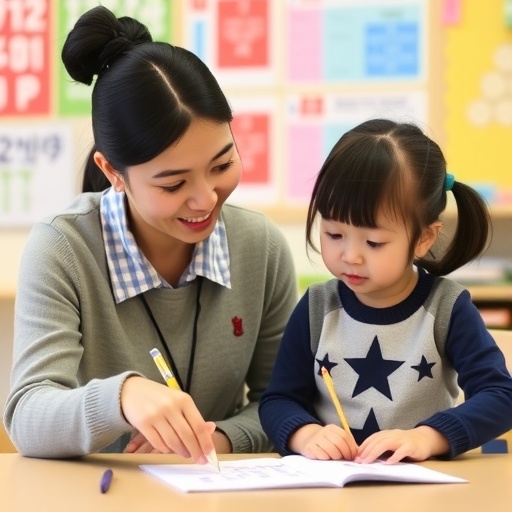In recent years, educators and researchers alike have turned their focus toward understanding the intricate relationships between teacher behaviours, instructional quality, and the academic development of young children. A comprehensive study undertaken in South Korea sheds new light on how these elements interconnect and influence preschoolers’ mathematical skills. The research conducted by Im, Choi, and Kwon emphasizes the critical role that teacher-child relationships play in the educational setting, especially concerning early numeracy.
At the heart of this exploration is the recognition that preschool is a pivotal time for cognitive development. Math skills acquired at this early stage lay the groundwork for future academic achievement and even lifelong learning. Impressive mathematical proficiency among young children has been shown to predict later success in school and beyond. Thus, understanding what influences these early skills becomes imperative for educators and policymakers.
The study highlights that the quality of teacher-child relationships is not merely a supplementary factor but a fundamental component in shaping children’s readiness and capability to engage with mathematical concepts. Teachers who build supportive, responsive, and nurturing relationships with their students create an environment conducive to learning. This emotional connection fosters a sense of safety for children, allowing them to explore, question, and commit to learning tasks with greater confidence and enthusiasm.
Concurrently, the research underscores the significance of instructional quality in the teaching process. Quality instruction encompasses a variety of elements, including the use of engaging teaching strategies, appropriate resources, and the ability to adapt to individual children’s learning needs. High-quality instruction can stimulate children’s interest in math, making complex concepts more accessible and less intimidating.
The interaction between teacher-child relationships and instructional quality is viewed within the framework of developmental and educational psychology. Researchers argue that when children feel cared for and understood by their instructors, they are more inclined to participate actively in the learning process. This participation is crucial, especially in subjects like math, where practical engagement often determines understanding and retention of concepts.
Furthermore, the study reveals that effective communication skills are paramount in enhancing these relationships. Teachers who actively listen to their students and respond appropriately not only contribute to a nurturing environment but also model essential communication skills. Such interactions encourage children to express their mathematical reasoning, boosting their confidence and competence in the subject.
As educational settings continue to adapt to global changes, the implications of this study are especially relevant. With increasing recognition of the importance of socio-emotional development alongside academic instruction, educators are called to cultivate a balanced approach. This study advocates for training programs that not only enhance pedagogical skills but also prepare teachers to forge strong, positive relationships with their students.
Interestingly, the findings of this research do not merely apply to the context of South Korea but could resonate with global educators, informing best practices in early childhood education worldwide. The universality of the principles outlined in the study indicates a broader need for systemic changes in teacher preparation programs and professional development opportunities focused on relationship building and high-quality instructional practices.
Educators are encouraged to view their roles not solely as transmitters of knowledge but as foundational figures in their students’ emotional and academic journeys. The responsibility lies in nurturing children’s potential through supportive interactions while simultaneously delivering high-quality instructional content that engages and excites young learners.
As parents and stakeholders advocate for effective early childhood education, findings like those presented in this study serve as compelling evidence for investment in teacher training and resources dedicated to fostering strong teacher-child dynamics. This investment could very well translate into improved educational outcomes, preparing children for not just math, but a lifetime of learning.
In the landscape of early childhood education, the message is clear: nurturing relationships combined with high-quality instruction create a thriving learning environment. Such insights are crucial as we strive to optimize educational experiences for the youngest learners, paving the way for both academic and social success as they progress through their educational journeys.
Ultimately, the implications of this research extend well beyond preschool mathematics. They touch on the broader ethos of education, emphasizing the need for emotional intelligence, relational skills, and pedagogical excellence in the formative years. As we move forward, the call to action is evident; prioritizing these elements will shape a brighter future for early education and its learners.
Subject of Research: The relationship between teacher-child connections, instructional quality, and preschoolers’ math skills.
Article Title: Linking Teacher-Child Relationships and Instructional Quality to Preschoolers’ Math Skills: Insights from South Korea.
Article References:
Im, H., Choi, J. & Kwon, KA. Linking Teacher-Child Relationships and Instructional Quality to Preschoolers’ Math Skills: Insights from South Korea.
Early Childhood Educ J (2025). https://doi.org/10.1007/s10643-025-01929-4
Image Credits: AI Generated
DOI: 10.1007/s10643-025-01929-4
Keywords: Teacher-child relationship, instructional quality, preschool education, mathematical skills, early childhood development.




